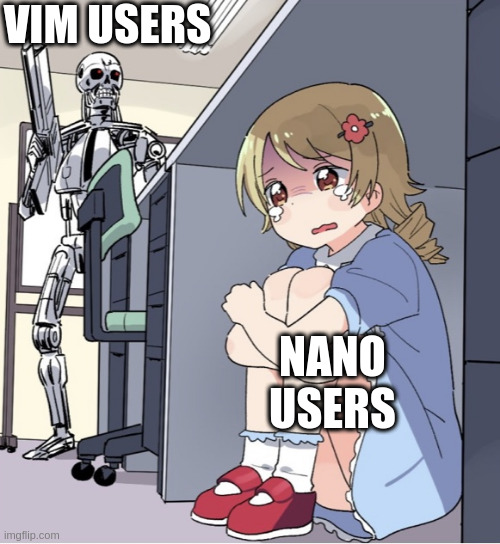this post was submitted on 02 Sep 2024
798 points (93.5% liked)
Linux
48313 readers
926 users here now
From Wikipedia, the free encyclopedia
Linux is a family of open source Unix-like operating systems based on the Linux kernel, an operating system kernel first released on September 17, 1991 by Linus Torvalds. Linux is typically packaged in a Linux distribution (or distro for short).
Distributions include the Linux kernel and supporting system software and libraries, many of which are provided by the GNU Project. Many Linux distributions use the word "Linux" in their name, but the Free Software Foundation uses the name GNU/Linux to emphasize the importance of GNU software, causing some controversy.
Rules
- Posts must be relevant to operating systems running the Linux kernel. GNU/Linux or otherwise.
- No misinformation
- No NSFW content
- No hate speech, bigotry, etc
Related Communities
Community icon by Alpár-Etele Méder, licensed under CC BY 3.0
founded 5 years ago
MODERATORS
you are viewing a single comment's thread
view the rest of the comments
view the rest of the comments

idk man, vims pretty chill, it even has a tutor in it already, what more could you want?
Yes, people are just lazy. I remember when I invented a new login screen and was told it was "difficult", "confusing" and "took some getting used to".
It even came with a free 100-page manual and a 4-hour master class. Some people, I tell you!
^This is meant more as a joke than an actual critique, even if it kind of reflects my thoughts. But ultimatly, I thought it was a funny bit.^
A text editor that doesn't need a tutor because the interface is intuitive enough that someone who has been using text editors (as a concept) for years can more or less instantly pick it up and start working without needing a tutorial to simply edit a config file.
a text editor that has a tutor because it's been around for so long and it's had so many years to establish itself with an outside control interface that's quite literally about as optimal as it can be. Vim basically allows you to never move your hands away from the homerow keys, even when navigating and doing bulk edits. The sheer amount of gained speed and productivity you get from this combined with the amount of times you'll have to deal with text editing throughout your life is probably going to outweight any potential learned annoyances.
Which is probably true, as long as you make one assumption- that the operator dedicates a significant amount of time to learning it. With that assumption being true- I'll assume you're correct and it becomes much more efficient than a Nano/Notepad style editor.
I'm happy to concede without any personal knowledge that if you're hardcore editing code, it may well be worth the time to learn Vim, on the principle that it may well be the very most efficient terminal-based text editor.
But what if you're NOT hardcore editing code? What if you just need to edit a config file here and there? You don't need the 'absolute most efficient' system because it's NOT efficient for you to take the time to learn it. You just want to comment out a line and type a replacement below it. And you've been using Notepad-style text editors for years.
Thus my point-- there is ABSOLUTELY a place for Vim. But wanting to just edit a file without having to learn a whole new editor doesn't make one lazy. It means you're being efficient, focusing your time on getting what you need done, done.
A text editor that doesn’t assume that the keys on my keyboard are in the same order as yours.
I remember looking up how to use Colemak with vim, and the advice was:
So I just gave up and moved on.
I hit the same wall with Dvorak layout.
that is a potential problem, though im sure there's a vim user somewhere that's fixed it with a bind set.
One that's intuitive and doesn't require a cheat sheet or what I like to call fingular contortionism discovery.